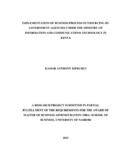| dc.description.abstract | In recent years, globalization and advances in information technology has revolutionized the way companies conduct business. Outsourcing of business processes is one of the key outcomes of the technological advancement (Manzi , 2007). The objectives of the study was to determine the extent of implementation of business process outsourcing management strategy in the agencies under the ministry of information, communications technology (ICT), to determine the factors affecting the implementation of business process outsourcing in the agencies under the ministry of information, communications technology (ICT). The study also sought to find out the benefits derived by the agencies under the ministry of information, communications technology (ICT) from implementing business process outsourcing. The research reviewed theories and empirical studies that explains the relationship between business process outsourcing. This included Transaction cost economics (TCE), core competences theory, economy of Information, agency theory and resource based theory which theories are governing the adoption of business process outsourcing in organizations. The population of the study was government agencies under Ministry of Information and Communication Technology. Primary data was collected using questionnaires. The data collected relate to the level of implementation of BPO, factors affecting BPO implementation and effects of BPO on organizations. Data analysis was done using Statistical Package for Social Sciences (SPSS) version 21 where factor analysis and regression analysis were employed. The findings of the study were that government agencies under Ministry of Information and Communication Technology has implemented business process outsourcing to a large extent in human resource management. However, it has been implemented to a moderate extent in marketing and public relations, operation management, information communication technology, procurement and logistics and financial management. The main factor affecting business process outsourcing was indicated as operational management, supplier overdependence, resource management, technology adoption and management commitment. The study concluded that business process outsourcing has positive effects in organizations. The study also concluded that BPO increases delivery of quality services, increases efficiency in organization, reduces training costs, gaining of specialized human resource expertise and enhances access to advanced technology. The study recommends that government agencies should implement business process outsourcing fully in various departments to improve service delivery. The study also recommends that government should make the adoption of business process outsourcing easy for the government agencies by reducing cost of implementation and policies governing outsourcing | en_US |

